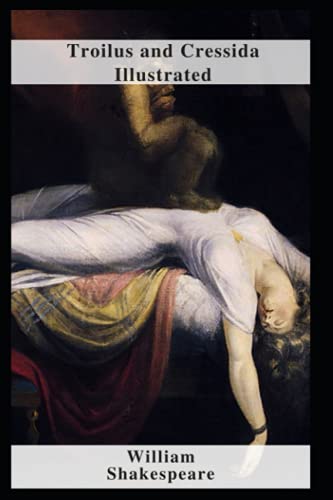What do you think?
Rate this book


216 pages, Paperback
First published January 1, 1601


”Were it not glory that we more affected
Than the performance of our heaving spleens,
I would not wish a drop of Trojan blood
Spent more in her defense. But, worthy Hector,
She is a theme of honor and renown,
A spur to valiant and magnanimous deeds,
Whose present courage may beat down our foes,
And fame in time to come canonize us”
Thersites: Prithee, be silent, boy; I profit not by thy talk. Thou art said to be Achille's male varlet.
Patroclus: Male varlet, you rogue. What's that?
Thersites: Why, his masculine whore.
The present eye praises the present object.
Then marvel not, thou great and complete man,
That all the Greeks begin to worship Ajax,
Since things in motion sooner catch the eye
Than what stirs not.
CRESSIDA. In kissing, do you render or receive?
PATROCLUS. Both take and give.
CRESSIDA. I'll make my match to live,
The kiss you take is better than you give;
Therefore no kiss.
MARGARELON. Turn, slave, and fight.
THERSITES. What art thou?
MARGARELON. A bastard son of Priam's.
THERSITES. I am a bastard too; I love bastards. I am a bastard
begot, bastard instructed, bastard in mind, bastard in valour, in
everything illegitimate. One bear will not bite another, and
wherefore should one bastard? Take heed, the quarrel's most
ominous to us: if the son of a whore fight for a whore, he tempts
judgment. Farewell, bastard.
Exit
MARGARELON. The devil take thee, coward!
Cressida: I wished myself a man, / Or that we women had men's privilege / Of speaking first.Cressida has no agency. She doesn’t have the right to shape her own future. When her father demands her exchange for a Trojan prisoner of war, Cressida has to leave. She has no choice. When she is then forced to marry Diomedes, she again has no say in the matter. Is awfully depressing when you then realise that Troilus didn’t even really love her. He loved the idea of her, he was madly in love with it – not with her. It’s frustrating that her “betrayal” causes Troilus to mark her as a “whore” and as unworthy. Cressida, just like Helen, is seen and treated as a prize by the men in her life. Nothing more.
Paris: Then I say, / Well may we fight for whom, we know well, / The world's large spaces cannot parallel.In Troilus and Cressida, debates about value centre initially on Helen, whose questionable worth serves as the pretext for the war. Hector maintains a traditionalist belief in Helen’s intrinsic value, but the doubts that this value is as great as has been reputed, claiming that “Every tithe soul, ‘mongst many thousand dismes, / Has been as dear as Helen”. To Hector, Helen is “not worth what she doth cost the holding”, because her worth is less than that of each of the soldiers who has died in her name. By contrast, Troilus defends the war not by praising Helen’s intrinsic value but by suggesting that all value is extrinsically determined. “What’s aught but as ’tis valued?”, he asks, suggesting that value is constituted by those who rate it, and he argues that it is politically expedient to honour such constructed value as true. Troilus depicts Helen as a purchase that cannot be returned because her value has been debased with use. Like meat that has been eaten and clothes that have been worn, Helen’s chastity has been sullied and depleted, making her unsuitable for other buyers. Whereas Paris hopes that winning the war may truly elevate Helen’s value, vowing that he “would have the soil of her fair rape / Wiped off in honourable keeping her”.
🥀“Time hath, my lord, a wallet at his back,
Wherein he puts alms for oblivion,
A great-sized monster of ingratitudes:
Those scraps are good deeds past; which are devour'd
As fast as they are made, forgot as soon
As done: perseverance, dear my lord,
Keeps honour bright: to have done is to hang
Quite out of fashion, like a rusty mail
In monumental mockery. Take the instant way;
For honour travels in a strait so narrow,
Where one but goes abreast: keep then the path;
For emulation hath a thousand sons
That one by one pursue: if you give way,
Or hedge aside from the direct forthright,
Like to an enter'd tide, they all rush by
And leave you hindmost;
Or like a gallant horse fall'n in first rank,
Lie there for pavement to the abject rear,
O'er-run and trampled on: then what they do in present,
Though less than yours in past, must o'ertop yours;
For time is like a fashionable host
That slightly shakes his parting guest by the hand,
And with his arms outstretch'd, as he would fly,
Grasps in the comer: welcome ever smiles,
And farewell goes out sighing. O, let not virtue seek
Remuneration for the thing it was;
For beauty, wit,
High birth, vigour of bone, desert in service,
Love, friendship, charity, are subjects all
To envious and calumniating time.”🥀
🥀Her bed is India: there she lies, a pearl.🥀